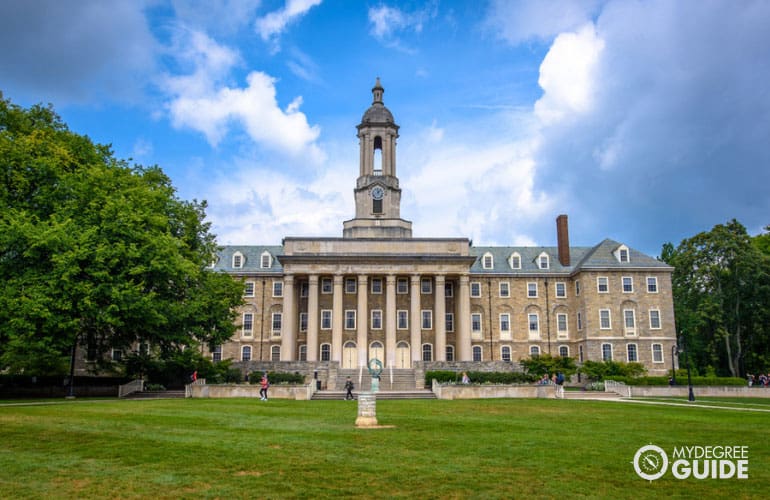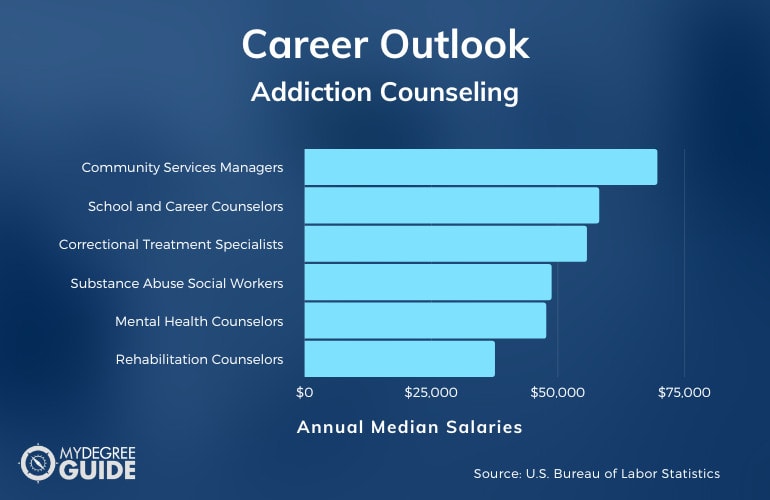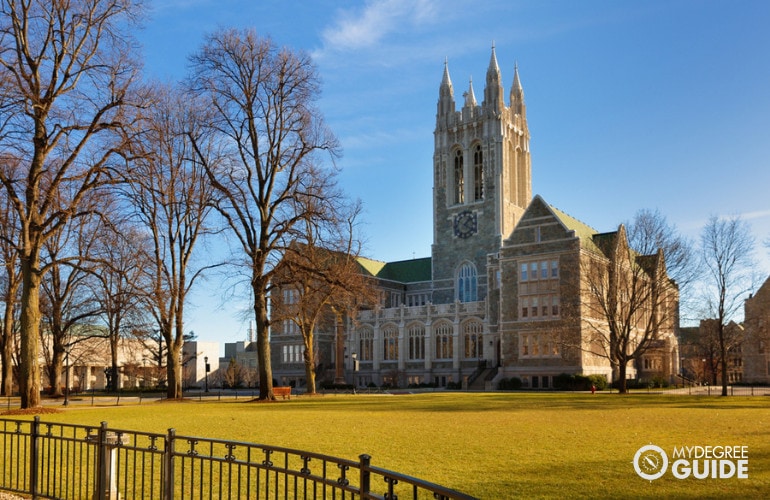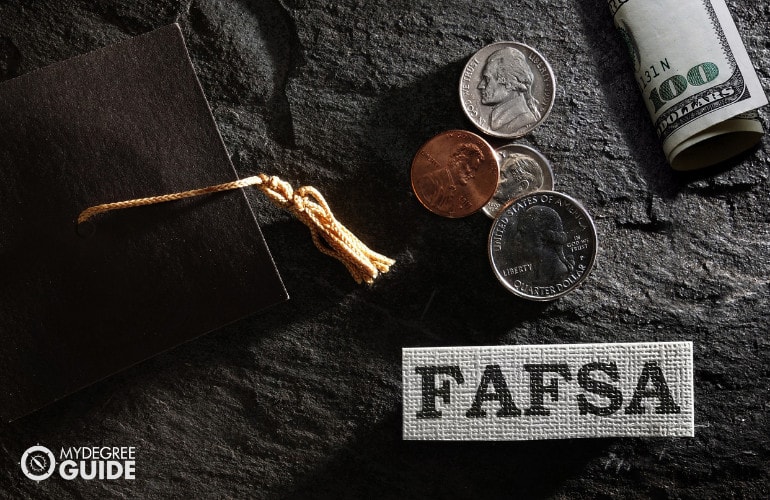We’ve identified 10 accredited online addiction counseling degree programs for 2024. Compare online substance abuse counseling schools and degrees.

When people reach their breaking points with addiction, professional counselors can step in to help them restore their lives. The work of an addiction counselor can be challenging, but it can bring with it great personal rewards.
Editorial Listing ShortCode:
National Institute on Drug Abuse reported over 70,000 people overdose on drugs for the past year. This staggering statistic highlights the need for caring, compassionate professionals who can intervene for addicted people and their families.
You can join the ranks of qualified helpers by earning your online master’s degree in addiction counseling. As you study, remember that the work you do can make a lifelong difference for people in need.
Universities Offering Online Addiction Counseling Degree Programs
Methodology: The following school list is in alphabetical order. To be included, a college or university must be regionally accredited and offer degree programs online or in a hybrid format.
1. Bethel University
Bethel University is an educational institution with the mission of building the lives of its learners through Christian teachings and biblical foundations. It is committed to creating leaders that will make an impact not only in the Church but in the whole world in general.
Bethel offers over 62 programs to help learners achieve their greatest potential academically, socially, emotionally, and spiritually. There are over 15 clubs and organizations that engage students in co-curricular and extracurricular that enhance religious, physical, and social well-being.
Learners can enjoy personalized learning with individual academic advising and financial guidance, affordable education, top-notch teaching, and flexible online education.
- Masters in Counseling – Addictions Counseling
Bethel is regionally accredited by The Higher Learning Commission.
2. California Southern University
Founded in 1978, California Southern University has been delivering high-quality education to non-traditional students for decades. It boasts of providing its learners with the support they need individually, while providing convenient, affordable, and quality education.
Students who are pursuing a career as well as a degree can maintain a healthy balance as the university allows them to work at their own pace through their online courses. There are no entrance exams. so students can start learning without getting pressured in passing a standardized test.
With excellent faculty and members of staff, students can get the boost and support they need to achieve their individual academic goals.
- Master’s in Psychology – Advanced Addiction Studies
CalSouthern is accredited by the WASC Senior College and University Commission.
3. Capella University
Capella University offers degrees that are designed for the modern world, all at the convenience of your own time with their online education programs.
Online courses are developed according to a thorough consultation with industry professionals and leaders, so learners can be assured that the knowledge they acquire are relevant and useful.
Capella aims to fulfill their vision of creating a unique and different path to obtaining a degree, one that is life-transforming for working professionals.
- Master’s in Addiction Studies
Capella is accredited by the Higher Learning Commission.
4. Drexel University
Drexel University believes that an investment in your education is an investment in your future. They have a mission to provide students with practical knowledge for professional success.
They offer online degrees in partnership with over 500 organizations, including schools, health systems, and professional associations to provide relevant career opportunities for their graduates.
With an excellent line of faculty members who are professional, energetic, and fully committed to delivering the highest standards of education, learners are comforted with the quality of education they’re getting!
The teachings are based on engaging learners with their professional interests to build valuable learning experiences.
- Master’s in Addictions Counseling
Drexel is regionally accredited by the Middle States Commission on Higher Education (MSCHE).
5. Emporia State University
Emporia State University helps to prepare students for lifelong learning and opens a door for rewarding career opportunities. It was founded in 1863 and has produced many successful professionals over the centuries.
Around 97% of its graduates have landed outstanding jobs after graduation, and most of them advanced in their professional qualifications by taking up postgraduate studies.
The university highlights the Stinger Success Program, which gives excellent support to students through a dedicated academic advisor, freshman seminar, and other academic support services. They also offer online courses for those who want to study more flexibly.
Their campus is home to a number of attractions that students and guests could enjoy. This includes natural areas, a Museum of Natural History, herbarium, planetarium, and rock garden. There is so much to see in their rich and vibrant campus environment.
- Master’s in Clinical Counseling – Addiction Counseling
Emporia State is accredited by the Higher Learning Commission.
6. Governors State University
Governors State University was founded in 1969 in the State of Illinois. It offers 64 degree courses and 24 certificate programs in the fields of arts, business, industry, healthcare, and education.
The university is known for offering quality education at an affordable cost. In fact, it is named as the most affordable university in the state of Illinois when it comes to undergraduate courses. Moreover, it has a team of faculty and staff who are experts in their fields and are dedicated to providing the highest standards of learning to their students.
GSU also provides students with a flexible way of attending classes by offering day classes, night classes, and online classes across different courses of study.
- Master’s in Addictions Studies
Governors State University is accredited by the Higher Learning Commission of the North Central Association of Colleges and Schools.
7. Grand Canyon University
Grand Canyon University is a Christian university founded in 1949 and driven by the strong passion for leadership and success. The university was founded as a Baptist university, but it welcomes everyone from all religious and cultural backgrounds.
It is clear and transparent in its identity as a Christian university and is committed to upholding and living out the faith in accordance to its mission and vision.
With their goal of sharing diverse cultures and unique perspectives for students to grow into global citizens, GCU has welcomed international students from different countries, including, Japan, Australia, Denmark, China, the UK, and Vietnam.
At GCU, students can explore more learning options with their Hybrid Degree programs for those who are interested in taking both online courses and in-person classes.
- Master’s in Addiction Counseling
- Master’s in Christian Counseling of Substance Use and Addictive Disorders
Grand Canyon University is regionally accredited by the Higher Learning Commission (HLC).
8. University of South Dakota
The University of South Dakota boasts of its world-class academics, innovative technology, outstanding mentors, and a long-time tradition of excellence. Founded in 1862, it is known as the state’s oldest university. It offers over 200 undergraduate courses and 78 graduate programs.
Students can take part in different clubs and organizations on campus to boost their social skills. There are more than 120 organizations to choose from, including social, sports, religious, and hobby groups.
The university is located in the picturesque 274-acre campus in Vermillion, a small lovely community overlooking the beautiful Missouri River. The strategic location makes it perfect for different attractions and activities for students and visitors to enjoy.
- Master’s in Addiction Studies
USD is accredited by the Higher Learning Commission.
9. Virginia Commonwealth University
VCU is a vibrant and diverse academic institution in the heart of Virginia. They operate on a mission to advance knowledge and student success by fostering inquiry, discovery, and innovation among learners. They provide a diverse environment for students from all backgrounds, providing them with sustainable partnerships and collaboration within the community.
The university is committed to nurturing discovery and creativity among its students with the more than 200 courses they offer. They also put emphasis on research and consider it as a way of life.
- Master’s in Addiction Studies
VCU is accredited by the Southern Association of Colleges and Schools Commission on Colleges.
10. Wright State University
Wright State University was founded in 1964 as a branch campus of Miami University. It was founded at a time when there was a lack of state-funded universities for higher education in the state.
Presently, the university prides itself with a vast 557-acre campus that is home to lush forests and a biology preserve. They also have state-of-the-art facilities, including academic buildings, student residential accommodation, sports venue, and underground tunnels connecting 20 buildings inside the campus.
The university upholds the values of diversity, discovery, innovation, partnerships (locally and globally), relationships, sustainability, and stewardship.
- Master’s in Rehabilitation Counseling – Addiction Counseling
Wright State is accredited by the Higher Learning Commission (HLC).
Master’s Degree in Addiction Counseling Online
Here’s a list of substance abuse and addiction counseling programs.
Click on the substance abuse counseling degree that most interests you to jump to that section of the guide:
- Master’s in Addiction Studies
- Master’s in Counseling – Addictions & Recovery
- Master’s in Psychology – Addictions
- Master’s in Social Work
Each Counseling master’s degree is geared toward a different career field.
Earning your substance abuse counselor degree can have many benefits for your addiction counseling career. In some states, you can’t practice as an addiction counselor without a master’s degree. In other states, earning your master’s can grant you greater responsibilities and more independence.
A master’s program can better equip you to help people in need. You can become better versed in addiction theories and counseling techniques, and you may complete in-depth studies in a particular aspect of addiction counseling.
Those studies may allow you to specialize as a youth addiction counselor, for example. Your master’s degree may also enable you to counsel a variety of clients, not just those with addictions.
You can fulfill many of the requirements for this 30-50-hour program online. Computer-based college is a flexible schooling option that works for many students. For addiction counseling studies, you may have to complete an in-person internship or practicum.
Master’s in Addiction Studies

Pursuing a master’s in addiction studies is one of the most focused ways to prepare for a career as an addiction counselor. Nearly all of your coursework should be directly applicable to working with people who deal with addictions.
You may study a wide variety of addictions, including drugs, alcohol, sex, and gambling.
Your classes may cover topics like the cultural influences that can affect addiction and the treatment of co-occurring disorders. Other classes may address program management, addiction assessments, behavioral therapies, and medication-assisted addiction treatment.
You can also gain new skills for working with clients individually and in group settings.
Programs in addiction studies usually prepare students for certification or licensure. An internship may be built into the program, and additional work hours may necessary after graduation.
Always confirm that a school’s licensure program is compatible with your state’s requirements before enrollment.
Master’s in Counseling – Addictions & Recovery

Master’s degree programs in counseling are typically general surveys of counseling ideas and techniques. Rather than focusing only on addiction studies, they focus on working with groups, families, and students.
Your coursework will most likely cover counseling theories, diversity, human development and assessment techniques.
To prepare you to work with people who have substance abuse disorders, you may pursue an Addictions and Recovery track as part of your counseling program. In this specialization, you can take additional classes to increase your knowledge of addiction science and treatment methods.
These might cover topics like psychological testing, sexual addiction, and the recovery process.
At some schools, this is a licensure program, but it is a non-licensure degree at others. If you enroll in a licensure track, you will probably have to complete an internship before graduation.
Masters in Psychology – Addictions

In a psychology program, you’ll probably take many of the same classes as the students who are going into industrial-organizational psychology, educational psychology and other branches of the field.
The courses may include Human Lifespan Development, Counseling Theories, Psychopharmacology, and Statistics for Psychology.
You can also take classes that are specific to your Addictions specialization. These may include Physiology of Addiction and Personal Care for Addiction Counselors.
If your program includes a practicum component, you may have opportunities to learn from professional addiction counselors in your area.
Earning your master’s in psychology won’t necessarily be sufficient for licensure in your state. You may be eligible for various certifications after graduation though, or your degree could help prepare you to pursue a doctorate in psychology or a PhD in Counseling.
Master’s in Social Work

Getting your Master’s in Social Work online may be a good option for those who want to enhance their counseling skills and learn about working in social services settings while enjoying a flexible degree program.
Social workers often find employment in non-profit and community organizations. They might be therapists, program managers, caseworkers, or agency administrators.
In school, you may take classes like Advanced Social Work, Social Justice, Social Policy, and Professional Documentation. You and your classmates can learn about working with individuals, families, and groups and discuss operating in diverse, multicultural settings.
Certification options for those with an MSW vary among states. You will probably need to do an internship or a practicum, especially if you want to become a Licensed Clinical Social Worker.
Addiction Counseling Specializations & Curriculum

In your master’s coursework, you can take a mix of classes that are designed to help you better understand addiction science, counseling approaches, treatment options, interpersonal dynamics, and human services.
You may take classes like:
- Addiction and the Family: Discuss how family dynamics can foster addictive behaviors or provide support during treatment.
- Addiction in Youths: Explore prevention strategies for young people, and learn about the unique needs of teens with substance abuse disorders.
- Assessing Addiction: Learn how to evaluate new clients and assess progress.
- Mental Health and Addictive Disorders: Discuss the prevalence of co-occurring disorders and explore treatment options.
- Models for Substance Abuse Treatment: Learn about the various approaches to addiction treatment and develop a framework for deciding which to use for a client.
- Psychopharmacology: Learn how prescription medications can be used for drug rehab and mental health treatment.
Many schools also require one or more courses that are devoted to practicum or internship experiences.
Your program may offer concentration options. To specialize in a particular area of addiction counseling, you may take several classes centered around that topic.
Choices may include:
- Alcoholism: Study the science of alcohol addiction and learn about treatment options.
- Drug Abuse: Learn about treatment and recovery for addictions to drugs like opiates and methamphetamines.
- Clinical Counseling: Prepare for clinical licensure through classes and internships.
- Dual Diagnoses: Specialize in co-occurring mental health disorders and addictions.
- Youth Services: Learn specialized skills for working with teens and families in schools and community settings.
Taking classes in a concentration area may increase your suitability for certain jobs.
Careers in Addiction Counseling

You know that you want to help people break free from their addictions. What jobs can help you meet that goal?
With a master’s degree in substance abuse counseling, you may have several career options from which to choose.
- Community services manager: You could coordinate programs or supervise caseworkers at a treatment facility or a social services agency.
- Correctional treatment specialist: In this position, you could help people whose addictions have landed them in the criminal justice system.
- Mental health counselor: As a mental health counselor, you might work with a mix of patients, or you could specialize in addiction treatment.
- Rehabilitation counselor: Your responsibilities might include helping people with addictions rebuild their lives after inpatient treatment.
- School counselor: If you want to help youths live drug-free lives, you could work in the schools. You might address prevention as well as addiction treatment.
- Substance abuse counselor: You could provide individual and group therapy for those with addictions.
According to the U.S. Bureau of Labor Statistics, careers in this field are expected to increase over the next decade. Jobs for substance abuse and mental health counselors may go up by 25% over the next ten years.
Overall, jobs for community and social services managers may increase by 12%.
Master’s in Addiction Counseling Salary

The pay scale for addiction counselors can vary widely depending on the position you hold. Other factors include where you live and how much professional experience you’ve acquired.
According to the Bureau of Labor Statistics, some careers in the addiction counseling field include:
| Careers | Annual Median Salaries |
| Community Services Managers | $69,600 |
| School and Career Counselors | $58,120 |
| Correctional Treatment Specialists | $55,690 |
| Mental Health and Substance Abuse Social Workers | $48,720 |
| Substance Abuse, Behavioral Disorder, and Mental Health Counselors | $47,660 |
| Rehabilitation Counselors | $37,530 |
Earning your master’s may allow you to advance to a higher paying position.
Addiction Counseling Certifications

Pursuing licenses and certificates can be an excellent way to demonstrate your competency as an addiction counselor. Plus, your state may regulate the credentials you need before practicing as an addiction counselor.
Licenses and certificates for addiction counselors include:
- Licensed Clinical Professional Counselor (LCPC)
- Licensed Master Social Worker (LMSW)
- Master Addictions Counselor (MAC)
- National Certified Addiction Counselor, Levels I and II (NCAC I, NCAC II)
- National Certified Adolescent Addictions Counselor (NCAAC)
- National Certified Counselor (NCC)
Many of these organizations provide the opportunity to earn a corresponding substance abuse counselor certification online.
Whether mandated by your state or voluntary, licenses and certificates may help you secure a job as further proof of your expertise in the field after earning your drug counselor degree.
As you increase your education and gain more professional experience, you may be able to apply for additional certifications. Continuing education credits may be required for maintaining your certified or licensed status.
Addiction Counselor Professional Organizations

You can build connections with others who work in the field of substance abuse when you join a professional association. These organizations may provide newsletters, classes, job postings, conferences, and other resources.
Organizations for addictions counselors include:
- American Counseling Association
- American Mental Health Counselors Association
- American Society of Addiction Medicine
- International Association of Addictions and Offender Counselors
- NAADAC: The Association for Addiction Professionals
Many of these organizations will allow you to learn from people in other counseling disciplines and those who work in other areas of substance abuse treatment.
Admission Requirements

You have your sights set on a master’s in addiction counseling. What do you need to do to get there?
Your journey to graduate school may look like this:
- Earn a bachelor’s in addiction counseling (or a related social science field)
- Begin earning experience in the field.
- Prepare for grad school by researching universities, applying for financial aid, and take the GRE (some colleges don’t require the GRE).
- Submit all application materials to your top schools, and wait to learn whether you’ve been accepted.
Your university’s admission requirements may include an application, an essay, a resume, past transcripts, test scores, and letters of recommendation.
Accreditation

Accreditation from a counseling organization demonstrates that a program’s faculty is dedicated to the highest standards of excellence. Although programmatic accreditation is not mandatory, it can be useful for licensure and employment purposes.
Many addiction programs seek accreditation from the Council for Accreditation of Counseling and Related Educational Programs (CACREP), but the National Addiction Studies Accreditation Commission (NASAC) certifies schools as well.
As with any program, you should only enroll if the school bears regional accreditation. This mark of excellence must come from one of the country’s approved regional accreditors.
Financial Aid

Starting a master’s degree can be costly. Thankfully, there are plenty of resources to help lighten your financial load.
The first place to look is the federal government. By filling out the Free Application for Federal Student Aid (FAFSA), you’ll find out how much aid you qualify for in grants and loans.
Next, check your state’s financial aid options. Also, as a student interested in addiction counseling, you may find plenty of private organizations willing to support you with grants and scholarships.
And, of course, check your prospective schools for scholarship opportunities.
Finally, ask your employer about possible educational assistance.
What Is Needed to Become a Substance Abuse Counselor?

To become an addiction counselor, you’ll need to attain a certain level of education, accumulate work hours, and pass a licensing exam, but the specifics vary from state to state.
Many states require a master’s degree.
What Can I Do With a Master’s in Addiction Counseling?
Working as a substance abuse counselor is a popular career option for people who study addiction counseling.
You could also go into corrections, social work, mental health, or family services.
How Long Does It Take to Get a Master’s in Addiction Counseling Online?

A full-time master’s program may take 2-3 years. The length of the practicum or internship requirements can greatly influence the length of a program.
Keep in mind that earning more hours during your substance abuse counselor schooling may reduce the number of licensure hours that you have to acquire post-graduation.
Getting Your Addiction Counseling Degree Online

Your first step is to decide which concentration to pursue. Then, choose the substance abuse counseling schools with the program that fits your career goal.
And don’t forget to look to the government, private organizations, your employer, and the school itself for funding.
